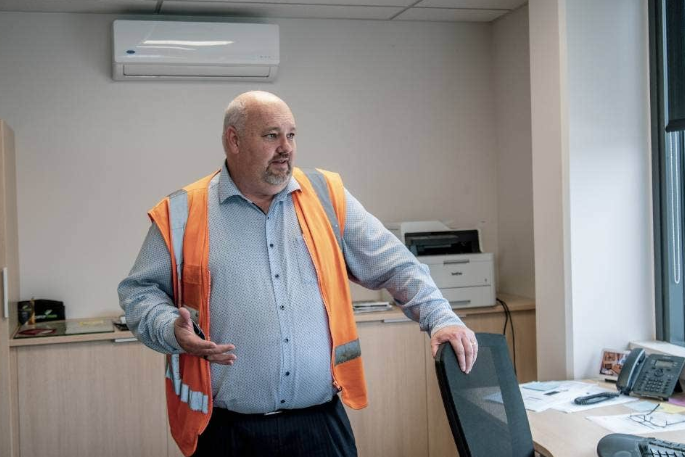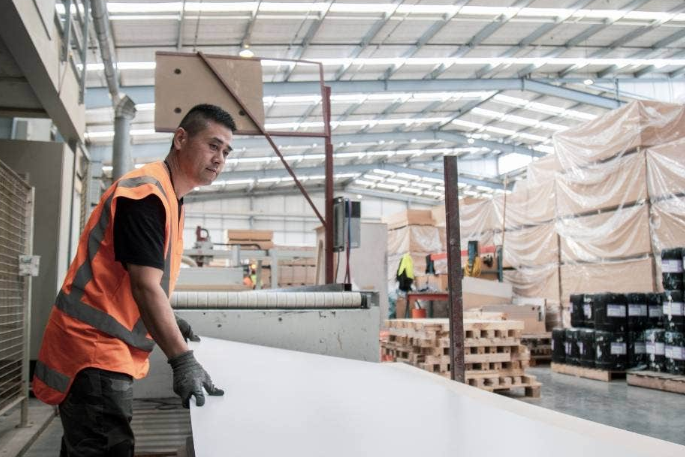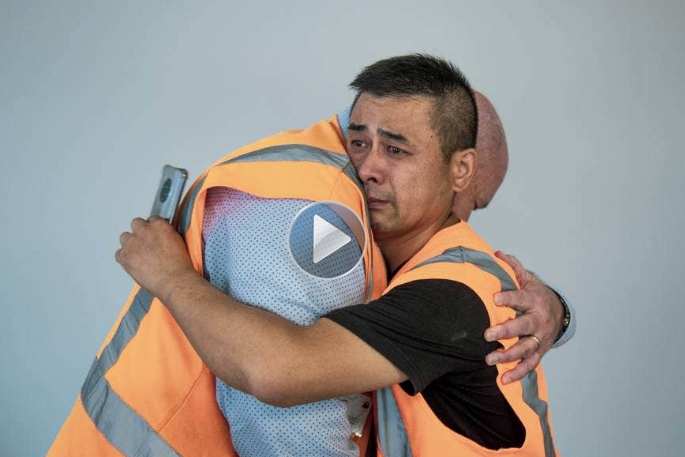Bao Guo was in tears as he Stuff his story. He'd gone deep into debt to pay an unscrupulous agent to secure him a New Zealand visa. Within days of his arrival, he'd been sacked. Now he had no money, and could only afford to eat instant noodles. Like many Chinese construction workers, his Kiwi dream was now a nightmare.
But this is, unusually, a good news story. After Stuff reported his plight, eight different employers contacted us with job offers. Others offered food or help with translation.
And one of those concerned readers was Aaron Davidson, the general manager of Papakura door manufacturers Superior Doors.
It was the noodle diet that really got to Davidson. 'I looked at that, and thought ‘we can do better than that',” he says.
Video: David White/Stuff.
There were hurdles to leap. Davidson had no Mandarin. Bao spoke no English. And he had to secure a six-month Exploited Worker Protection Visa, so he could legally complete a three-day work trial at the factory.
But Davidson was encouraged that he had a fluent Mandarin speaker on staff - the company accountant - and that he could conduct basic conversations with Bao over Google Translate, and by using a small robotic translation device Bao carries with him.
And it was clear that Bao wanted to work: at first, he was taking a three-hour journey on public transport from West Auckland for a 6am shift start. Now he's moved to the area, and bought a car (although it was stolen within the first week).
He can't yet work in the small teams who assemble the doors, who work a complex job at pace and need to communicate together well, but he is on a line where a UV machine paints the doors, and he's happily racking up overtime to pay off his debts at home. He's adopted the English name Mike, and beams when he sees Stuff's reporter and photographer from across the factory floor.
'I'm very happy to work in this factory,” ‘Mike' says, through his translation device. 'The boss is very good to me, and the other employees are very enthusiastic and willing to help me. I am happy to work here for a long time - but because of the visa I don't know what will happen.”
Making the right choices
Employing Bao Guo was not an atypical response from Aaron Davidson, but the result of a carefully-considered personal philosophy about how to run a business.
His is a true family firm: all four siblings work at the company, which is owned by their parents, Christine and Kenneth.
Aaron, the eldest, was the last to return to the nest, taking over as general manager three years ago after a career spent as an IT and telco lawyer, software developer and then an adjudicator in the Disputes Tribunal, Tenancy Tribunal and the Immigration Protection Tribunal.
He says Superior Doors has grown to become comfortably the largest domestic door manufacturer, and that size – it employs about 80 staff – has brought an opportunity.
'You get to a point where you've got the luxury of making choices, and your choices affect other people's lives,” he says. 'Why wouldn't you engage your local community and employ people where it is going to make a meaningful difference? People who are perhaps struggling to get back into the workforce and who … just need a chance.”
He began just up the road. Growing up, the family home backed on to the Papakura Marae, whose front door is a few hundred metres along Hunua Road from the factory. The marae employs 75 staff, reaches about 50,000 people a year and runs a range of social services from a community meal to ready-to-work schemes. 'We are not your typical marae,” says chief executive Tony Kake.
When Superior Doors began partnering with the marae, it was Kake, says Davidson, who noticed there were no women on the factory floor, and encouraged him to employ some.
The marae now regularly send people to Davidson to work - usually those trying to find their way back into employment.

Aaron Davidson: 'You have the luxury of choice.” Photo: David White/Stuff.
'It's about how we can have a win-win-win,” Kake says. 'He wins because we help supply him with employees, we win because we are contracted by MSD [the Ministry of Social Development] to do some of the work, and it is a good thing to do for our community, and our whānau wins because they get a job. And I've always thought that it is one of the best things you can do for someone's health is to get them a job.”
Davidson, he says, 'is certainly one of our favourite people down Hunua Road. He's a long-time Papakura fella who has been there almost as long as the marae has been, and he's got a stake in the community - that's why I like him, because he's not shy to employ local.”
It was at a youth expo at the marae where Ruth Patterson met Aaron Davidson. Patterson is constantly looking for employers with an open mind and a social conscience, and she recognised right away 'he was someone who was into second chances”.
Patterson is an employment training consultant for the Department of Corrections, tasked with finding jobs for about 2,600 prisoners each year who are ready to rejoin the real world. She'll chase down Seek and TradeMe advertisers 'and boldly go where no man goes and make that call” to pitch her clients, trying to illustrate the difference between the criminal record and the person in the flesh, arguing 'that's what it says on paper, but that's not who Jimmy is now”.

Bao Guo at work on the production line at Superior Doors. Photo: David White/Stuff.
Patterson's boss, Karl Bethell, says Davidson is among a handful of employers with a 'very high social conscience” and is particularly good at navigating the tricky first few weeks with a new employee. Patterson will sit on interviews, and she says Davidson's staff have a knack of putting interviewees at their ease. 'If they've got the right attitude to work, this company is prepared to give them a go.”
The very first placement didn't work out, but Davidson was happy to try again, and Patterson has since successfully found another eight staff for him. 'You've got to be open to the fact that not everyone is going to stick, but you give them a crack,” explains Davidson.
He can see another opportunity to make a positive impact with exploited Chinese migrants and is exploring offering jobs to others who can secure the same visa as Guo, which allows them to work anywhere without meeting specific labour skills tests.
For Guo, there's still the concerns about what happens once his six-month clock expires, as immigration rules mean it's unlikely he will be allowed to stay in Davidson's employ, and he bursts into tears when asked about his family, whom he hasn't seen since arriving in New Zealand. But he says he has found hope for the future again.
'I don't want to make out we are some kind of charity, I've still got a business to run,” Davidson concludes. 'But you can make an impact on people. If you can make a profit while doing something meaningful for the community, not just meaningless thoughts and prayers on your website, but something to make a difference, then why wouldn't you?”



0 comments
Leave a Comment
You must be logged in to make a comment.